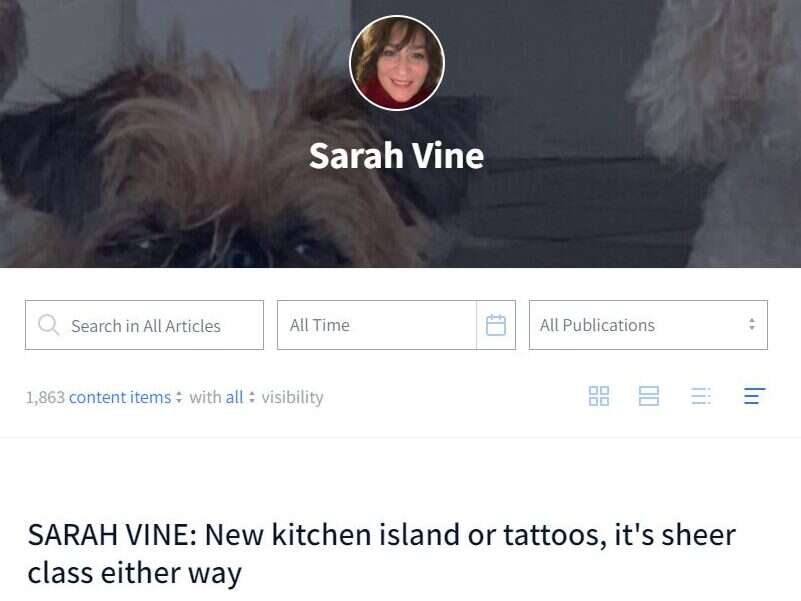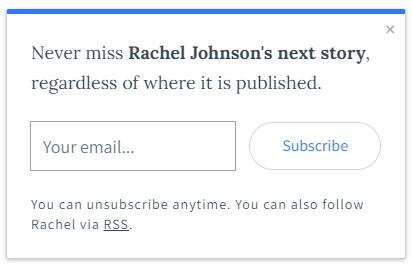
If you’ve ever spent hours taking screenshots of your online articles for fear they might be lost forever on the internet’s ever-changing tide, then Authory might be for you.
The platform goes beyond the results of simply searching your own name on Google, claiming to find every last article carrying a user’s byline that exists in cyberspace. Once captured the articles are protected even from the demise of the website on which they first appeared.
Authory continues to automatically update a user’s portfolio with their latest pieces and even offers a free subscription service so loyal readers will never miss out on new articles.
The platform emerged in its current form in 2019 and claims several high-profile journalists among its users, including tech columnist David Pogue, Wired editor-at-large Steven Levy, the Daily Mail columnist Sarah Vine and journalist and presenter Rachel Johnson.
Founder and chief executive Eric Hauch told Press Gazette he came up with Authory when “wondering why there wasn’t a direct gateway between journalists and readers like without publishers in between – sort of like Twitter but without the noise, just the content”.

This article is part of Press Gazette’s Platform Profile series. [See also: Instagram, NewsNow, Substack, Shutterstock, Upday, LinkedIn and Apple News/ Apple News+].
The basics
You have to be a paying user to have an Authory account, but non-users can access users’ profiles – and subscribe for updates – if users choose to make them public. Clicking article links will take readers through to the website where the piece was originally published, if still available.
| Authory | |
| What is it? | Personal publishing platform |
| Where is it available? | Online anywhere (in English only) |
| How much does it cost? | From $8 (£5.67) a month |
| Who’s on it? | Thousands of users |
| Pros? | All your content in one place |
| Cons? | Monthly fee |
How it works
Users need to give Authory a few key bits of information – name, places where they’re published – before its algorithm gets to work trawling the internet to find their articles, which it does in minutes. It will then automatically update their profile whenever they publish something new.
Articles will either link out to the original website where they were published, or if that no longer exists they will be hosted in a clean text format on Authory itself, with the platform acting as an internet archive. It hosts several million articles in its database across thousands of users.
“Google gives you a fraction of what’s out there”, said Hauch. “Our goal is to give you 100%, so whatever you’ve done in the past, whatever you’re going to do in the future, we want you to be able to have this all in one place and then offer you a number of services on top.”
These additional services include a subscription service for readers, a blogging platform, and even analytics that tell users how their articles have performed on the platform and social media.
It adds up to a private publishing platform for anyone who writes for a living or who wants to keep their media profile in one place.
What’s more, if a user decides to leave the platform, they can take their email subscribers with them. Authory does not claim to own the audience.
“The idea here is that you can basically take your audience with you,” said Hauch, who started in investment banking before taking an internship at the FT on its commercial side.
Hauch said his team is working to bring audio and video to Authory, which will mean podcasts can also sit alongside articles in users’ portfolios.
Authory is even being to be offered to journalists in some newsrooms in the UK and US as a perk from publishers.
Show me the money
Authory is a tech start-up registered in Germany, but with a small team based across the world. Hauch invested his own money to create the platform and has also received €150,000 from Google’s innovation fund for digital news (which came to a close in 2019).
The platform makes money through subscriptions only, no advertising. Hauch said the company is breaking even.
“We’re very proud of the fact that… the product and everything [is built] from the perspective of journalists,” said Hauch.
“We are not collecting any data we are not reselling stuff… Journalists trust our platform, and that’s our biggest asset.”
Verdict
Authory is that rare thing: a platform created with journalists in mind. For those keen to maintain their own brand and loyal readers, it offers not only a portfolio but a fully-fledged personal publishing platform including analytics traditionally guarded by publishers.
Said Hauch: “The goal of Authory is to level the playing field for journalists – make sure they get tools and software that otherwise only very big corporations are able to afford.”
Email pged@pressgazette.co.uk to point out mistakes, provide story tips or send in a letter for publication on our "Letters Page" blog
